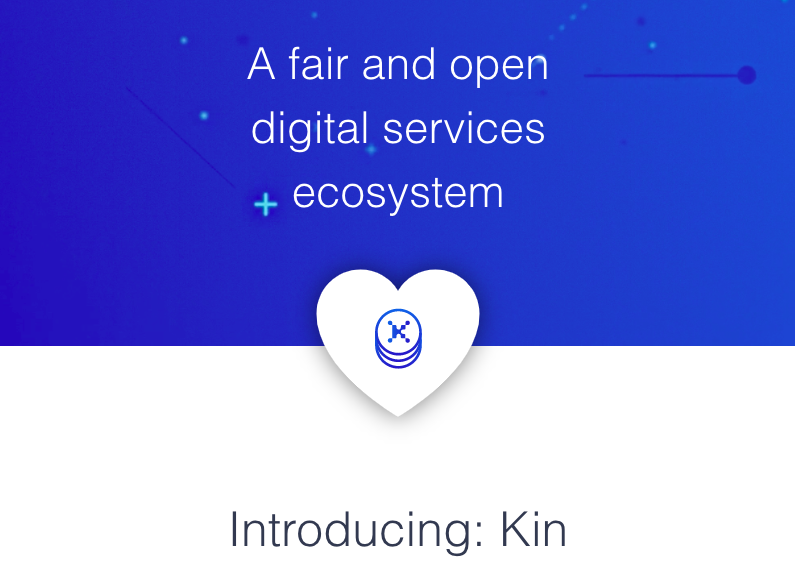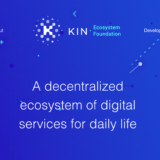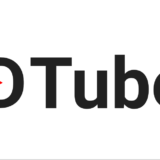以前,暗号通貨Kinについて書きました.
Kinは,メッセージアプリkikを運営している会社が発行している暗号通貨です.このアプリ内で,Kinを使用できるようにする計画です.
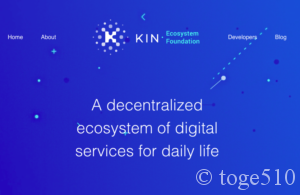
Mediumに,KikのCEOのTed Livingstonが,KINのビジョンについて書いています.英文読解力を向上と,Kinの理解のため,訳してみました.
今回は,KikのCEOのTed Livingstonが語るKINのビジョンについての訳を書きます.
Kinのビジョン(日本語訳 by Toge)
最初に言い訳します.訳は結構適当です.
私は最近,Kinのビジョンについての簡潔な説明を頼まれた.これは,私が書いたものである.
私は,朝に何百の人々が,スマホを持ちながら世界に価値を提供し,報酬を得ているのを想像する.彼らが提供する価値はたくさんの形があるだろう,例えば,アドバイスをすること,経験を主催すること,コンテンツを作成すること.そして,その報酬はKinという形になるだろう,Kinは機会均等のデジタルシェアリングエコノミーを促進する暗号通貨である.
私は,人々が互いに価値を提供することができるたくさんのデジタルプレイス(場所)を作る開発者を想像する.しかし,開発者に顧客からの価値を引き出すことを求める代わりに,Kinリワードエンジンは自動的に,消費者間の価値交換を促進させるために開発者に報酬を与える.それは,人々が互いに運転するデジタルLyft(Uberのようあ配車システムのこと)にような,または,人々が互いに部屋を貸すデジタルAirbnbをつくるようなものである.しかし,これらの開発者にライドやレンタルの手数料の取り方を理解させる代わりに,彼らは消費者にすべてをキープさせることができる.開発者は代わりにKinエコシステムの構築を助けるKinという形で,報酬を得られるだろう.開発者はよりこれらの場所をつくるに連れて,より多くの人々が集まり,報酬の価値は高まり,そして,より多くの人々のためのより多くの場所をつくり,より多くの開発者を惹きつける.
私は,人々がユニークな才能を世界に共有可能なたくさんの異なるデジタルプレイス,そして,人々が他人のユニークな才能を楽しみに行けるたくさんのデジタルプレイスがあるのを想像する.これらのデジタルプレイスにおいて,人々が受け取るKinは彼らの年齢,国籍,人種を隠すでしょう.代わりに,彼らの情熱やスキルのみに基づくでしょう.
これは野心的なビジョンである.我々は今日には存在しないデジタルシェアエコノミーを作りたい.なぜ簡単なものでスタートしないのか?なぜKinをビットコインのような代替支払い方法にしないのか?なぜスターバックスのような小売店と組んで,人々にKinで支払わせないのか?
その答えは,この世界は既にドルという通貨を持っているということである,そして,この世界の多くの人々にとって,ドルはとてもうまく回っている.スターバックスはコーヒー豆をドルで購入し,賃貸をドルで払い,従業員にドルで給与を支払う.もし,いつの日か,会社がビットコインを受け入れて,そして,ビットコインの価値が突然下落した場合,スターバックスはトラブル状態に陥る.結果として,スターバックスは,リスクを避けるため,直ちに受け取ったビットコインをドルに変えるだろう.しかし,そもそもビットコインを使用するポイントは何だろうか?
それは,デジタル世界は,新たな暗号通貨を始めるには説得力のある場所という点である.何百万の人々は既にデジタルプレイスという社会に価値を提供している,彼らは稼いでいない.彼らは,掲示板やゲーム内に存在する.ソーシャルアプリやチャットルームにおいて.そして,このデジタル世界において,ドルは機能していない.もし,私が,誰かのファッションアドバイスを得るために少額のお金を支払いたい場合,わずかなドルを送ることは困難だろう,しかし,10Kinを送ることは簡単であろう.
これが,Kinのビジョン:機会均等のデジタルシェアエコノミーである.何百万の人々が,スマホを通して提供する価値に対して報酬を与えられる世界,そして,開発者が,消費者が価値を互いに提供する凄い場所を作ることで,報酬を得る世界になるでしょう.人々が共に機能することで共に成功する世界になるでしょう.Kinの上に建てられたデジタル世界になるでしょう.
過去のKin関連の記事.
Kinの買い方は以下の記事.
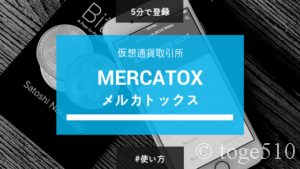
Kinについて,「お金2.0」で触れられています.
Amazon.co.jp経済学の売れ筋ランキング1位です.
ちなみに、今ちまたで流行っている「お金2.0」でも取り上げられていますよん!この本から上がってましたね。 pic.twitter.com/b7zDmwPW6T
— バナト (@BanAj0) 2018年1月2日
The Vision for Kin(原文)
I was recently asked to write a succinct piece on Kin’s vision. This is what I wrote.
I imagine millions of people sitting down with their phones each morning, providing value to the world and getting compensated. The value they provide would come in many forms, such as offering advice, hosting experiences or creating content. And the compensation would come in the form of Kin, a cryptocurrency to facilitate a digital sharing economy of equal opportunity.
I imagine developers creating thousands of digital places where people can go to provide value to each other. But instead of requiring developers to figure out how to extract value from consumers, the Kin Rewards Engine would automatically compensate developers for facilitating the exchange of value between consumers. It’s like building a digital Lyft, where people drive for each other, or a digital Airbnb, where people rent to each other. But instead of requiring these developers to figure out how to take a fee from each ride or rental, they can let consumers keep everything. The developers would instead be rewarded with Kin for helping to build the Kin Ecosystem. As developers create more of these places, more people come, and the value of the reward increases — thus attracting even more developers to create more places for more people.
I imagine a day when there are thousands of different places where people can go to share their unique talent with the world, and thousands of different places where people can go to enjoy the unique talents of others. In these places, the Kin people receive will be blind to their age, country, and race. Instead, it will be based solely on their passion and skills.
This is an ambitious vision. We want to create a digital sharing economy that doesn’t exist today. Why not start with something simpler? Why not just make Kin an alternative payment method like Bitcoin? Why not just work with retailers like Starbucks and let people pay with Kin?
The answer is that the physical world already has a currency — dollars — and for most of the physical world, dollars work quite well. Starbucks buys its coffee beans with dollars, pays its rent with dollars and pays its employees with dollars. If one day the company decides to accept Bitcoin, and Bitcoin’s value suddenly drops, Starbucks is in trouble. As a result, Starbucks could immediately convert any Bitcoin it receives into dollars, avoiding the exchange risk. But then what would be the point of using Bitcoin in the first place?
This is why the digital world is such a compelling place to launch a new cryptocurrency. Billions of people are already providing value to society in digital places — they just aren’t getting paid. They’re on message boards and in games. In social apps and chat rooms. And in this digital world, dollars don’t work. If I wanted to pay a small amount of money to get someone’s fashion advice, it would be difficult for me to send them a fraction of a dollar, but it would be easy for me to send them 10 kin.
This is the vision for Kin: a digital sharing economy of equal opportunity. It would be a world where millions of people are compensated for the talent they provide through their phones, and a world where developers get compensated for creating amazing places for consumers to provide value to each other. It would be a world where people win together by working together. It would be a digital world built on Kin.
Ref. The vision for Kin by Ted Livingston , Founder and CEO of Kik
